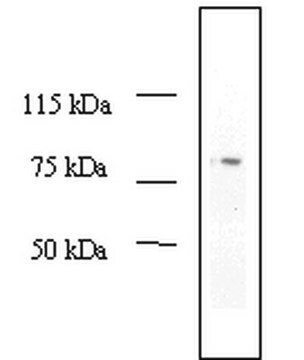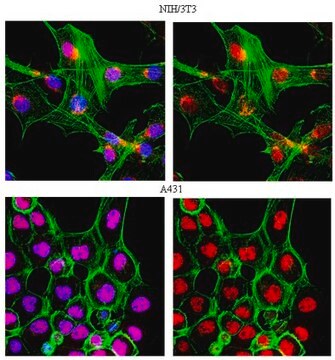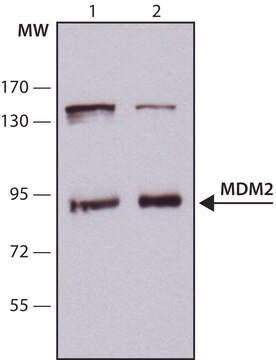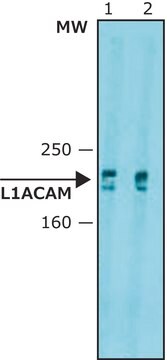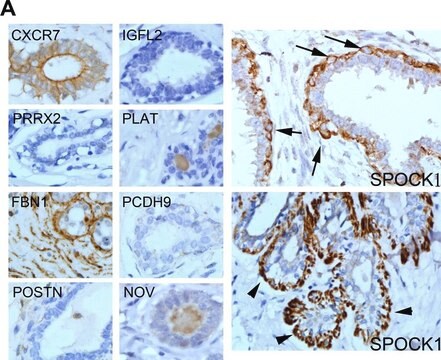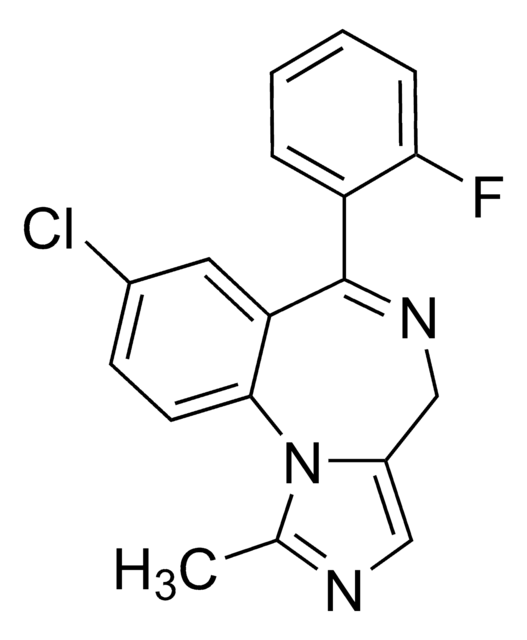OP143
Anti-MDM2 (Ab-3) Mouse mAb (4B11)
liquid, clone 4B11, Calbiochem®
Synonym(e):
Anti-Ubiquitin Protein Ligase, Anti-p53 Binding Protein, Anti-Murine Double Minute Chromosome-2
About This Item
Empfohlene Produkte
Biologische Quelle
mouse
Qualitätsniveau
Antikörperform
purified antibody
Antikörper-Produkttyp
primary antibodies
Klon
4B11, monoclonal
Form
liquid
Enthält nicht
preservative
Speziesreaktivität
mouse, human
Hersteller/Markenname
Calbiochem®
Lagerbedingungen
OK to freeze
avoid repeated freeze/thaw cycles
Isotyp
IgG2a
Versandbedingung
wet ice
Lagertemp.
−20°C
Posttranslationale Modifikation Target
unmodified
Angaben zum Gen
human ... MDM2(4193)
mouse ... Mdm2(17246)
Allgemeine Beschreibung
Immunogen
Anwendung
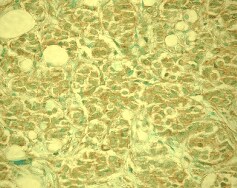
Immunoblotting (2 g/ml, chemiluminescence)
Immunofluorescence (1 g/ml)
Immunoprecipitation (1 g/reaction)
Paraffin Sections (2.5 g/ml, heat pre-treatment required)
Verpackung
Warnhinweis
Physikalische Form
Rekonstituierung
Hinweis zur Analyse
A549 cells
Sonstige Hinweise
Barak, Y., et al. 1993. EMBO. J.12, 461.
Ladanyi, M., et al. 1993. Cancer Res.53, 16.
Leach, F. S., et al. 1993. Cancer Res.53, 2231.
Oliner, J. D., et al. 1993. Nature362, 857.
Momand, J., et al. 1992. Cell69, 1237.
Oliner, J. D., et al. 1992. Nature358, 80.
Fakharzadeh, S. S., et al. 1991. EMBO. J.10, 1565.
Rechtliche Hinweise
Sie haben nicht das passende Produkt gefunden?
Probieren Sie unser Produkt-Auswahlhilfe. aus.
Lagerklassenschlüssel
10 - Combustible liquids
WGK
WGK 3
Analysenzertifikate (COA)
Suchen Sie nach Analysenzertifikate (COA), indem Sie die Lot-/Chargennummer des Produkts eingeben. Lot- und Chargennummern sind auf dem Produktetikett hinter den Wörtern ‘Lot’ oder ‘Batch’ (Lot oder Charge) zu finden.
Besitzen Sie dieses Produkt bereits?
In der Dokumentenbibliothek finden Sie die Dokumentation zu den Produkten, die Sie kürzlich erworben haben.
Unser Team von Wissenschaftlern verfügt über Erfahrung in allen Forschungsbereichen einschließlich Life Science, Materialwissenschaften, chemischer Synthese, Chromatographie, Analytik und vielen mehr..
Setzen Sie sich mit dem technischen Dienst in Verbindung.